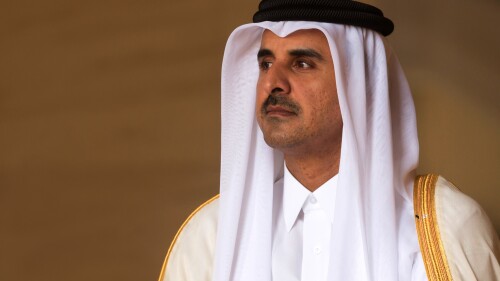The elimination of Hassan Nasrallah, coupled with the damage to Hezbollah’s leadership structure and operational capabilities, marks a potential turning point in the Middle East. The IDF’s ground operation in southern Lebanon, the second attack in Yemen, and Israel’s success in withstanding two massive Iranian missile attacks demonstrate Israel’s brilliant intelligence and operational achievements. These events shake the entire Middle East and create potential for fundamental change. The nature and intensity of this change will depend significantly on Israel’s actions, as well as on United States and Iranian policies.
Hezbollah finds itself confused and battered, the price it paid for Nasrallah’s insistence on maintaining support for Hamas. Despite the blows it has suffered since the beeper attack, the organization does not intend to learn its lesson at this stage. It is unlikely to agree to disconnect the Lebanese front from the Gaza front, enter a ceasefire, or allow northern residents to return safely to their homes. Instead, Hezbollah will likely attempt to avenge the blow it suffered, in the spirit of its charismatic leader’s legacy and testament.
Hezbollah finds itself confused and battered, the price it paid for Nasrallah’s insistence on maintaining support for Hamas.
Hezbollah’s lack of preparation for the new reality will make it difficult for the organization to function effectively. It did not conceive of this situation until two weeks ago and has since repressed the significance of the change in Israel’s policy. The organization has failed to draw lessons from Israel’s successive strikes against it. This will increase Hezbollah’s dependence on Iran, which will be forced to focus on its rehabilitation.
At the strategic level, Nasrallah’s elimination and the series of other actions represent the ultimate expression of the change in the war’s trend. After October 7, the trend favored achievements for Hamas and the Iranian axis. They embarrassed Israel, undermined its confidence in its ability to protect its citizens, and worked to create an Islamist order under Iranian leadership in the Middle East. Gradually and patiently, Israel has reversed this trend. With limited consideration for American advice, Israel dismantled Hamas’s military capabilities. It took control of the strategically important Philadelphia Corridor and demonstrated its strength and creativity in a series of impressive operations. These culminated in Nasrallah’s elimination and the attack in Yemen—in short, Israel is winning.
This trend strengthens Israel’s regional standing and self-confidence while significantly weakening Iran and its sponsored entities, which are suffering heavy losses. It is still too early to determine to what extent this change will lead to a reversal. The peak of such a reversal should be Israel’s response to the Iranian attack and full normalization of relations between Israel and Saudi Arabia. The chances for integration between the countries—namely economic and security cooperation without a direct political dimension—have increased due to the blow to Hezbollah, the sworn enemy of the Riyadh regime.
The impact on Hezbollah’s strength and leadership will likely have implications for its status in Lebanon, the region, and in the eyes of its Iranian patron. Israel’s view of the organization will also be affected. Hezbollah’s rivals in Lebanon and the region will try to capitalize on its weakness, pushing it out of its position of power. They will demand that it act to solve Lebanon’s ongoing crises and prevent further destruction from expanded fighting.
Hezbollah’s rivals in Lebanon and the region will try to capitalize on its weakness, pushing it out of its position of power.
Israel has been careful not to damage Lebanese infrastructure. However, Lebanese residents, especially Shiites, are already paying an increasing price due to Hezbollah’s decisions. The role Hezbollah took upon itself as Lebanon’s protector seems ridiculous when it cannot protect itself. Pressure to bring about its disarmament may intensify. Without charismatic leadership, the organization will face difficulties implementing policies that categorically reject this idea, although it is likely to insist on it.
Continued fire towards Israel as revenge for the elimination of its revered leader leads Hezbollah into a dangerous trap. Nasrallah had identified this risk and was careful to avoid it. It gives Israel justification to launch a ground operation and encourages the U.S. to give Israel the green light to do so.
Despite the opportunities created by the shock to the “axis of evil,” the Biden administration adheres to its original priorities as the presidential election approaches. These include preventing escalation into a regional war, concern for the Gaza population and hostage return, and seeing political deals as the best way to achieve a ceasefire. However, given the escalating response of Iran and its proxies, the United States may change its position: it might back Israel’s forceful moves and, in extreme cases, even assist with force.
This narrows the gap between the Israeli and American strategies. Israel aims for victory through decisive action, weakening the axis of evil to force agreement to its terms or impose a new reality. The American strategy aims for compromise, promising illusory stability. Both strategies face enormous challenges. The American strategy lacks regional cooperation, while the Israeli strategy requires long-term de-radicalization and significant policy changes among regional powers. The chance for such change in the foreseeable future is low, leaving mainly the option of forcibly imposing a new reality.
Iran’s investments in building a ring of fire around Israel seemed successful, but this has proven to be an illusion.
The ball is now largely in Iran’s court. The Ayatollah regime is undergoing an unprecedented experience. Its investments in building a ring of fire around Israel seemed successful, but this has proven to be an illusion. Israel can almost single-handedly undermine the array Iran built. The main danger continues to be the threat of removing Hamas from power in Gaza. Now Iran’s proxies in Lebanon and Yemen are also proving unreliable for deterrence against potential strikes on Iran, particularly its nuclear program.
The regime showed concern about events demonstrating its vulnerability, such as Haniyeh’s elimination and the implications of its failed April attempt to avenge Mahdavi’s elimination in Damascus. This proved how dangerous the regime is, but simultaneously exposed how much less effective and more vulnerable it is than it had estimated. Now, it must improve protection of its assets, especially the Supreme Leader, and restore deterrence. It is promoting revenge moves against Israel, aiming for success and pain, but without provoking Israel—perhaps with American assistance—to further exploit Iran’s vulnerability, particularly through assassinations of senior Israeli officials. After realizing its efforts were failing, the regime decided to respond forcefully, as it did in April. This creates an opportunity for Israel to respond forcefully with American backing. The regime may also consider the possibility of a breakthrough in nuclear weapons production, based on everything it has prepared so far, as an alternative to the deterrence that Hezbollah was supposed to provide.
Israel’s success in changing the trend encourages it to take initiative in various arenas, focusing on the campaign against Iran and Hezbollah. This is necessary to achieve war objectives in Gaza and the north. However, the path to these goals may be prolonged. Hamas continues to hold 101 hostages. Hezbollah and Hamas struggle to admit failure and continue fighting. Regime change in Iran remains difficult. Israel must also preserve cooperation and coordination with the United States, vital for the campaign’s continuation, especially given possible Iranian moves.





